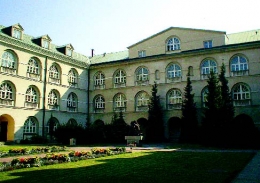Only two Poles showed up for a crash course in Irish organised last week by translation company Tadhall-Kontakt, with the assistance of Polish Express and the Polish Financial Centre. But they were dedicated pupils nonetheless.
Both participants, Krzysztof and Malgorzata, were determined to pick up the language after being introduced by others – work colleagues in the case of the former, and a flatmate for the latter.
But to hear it and to learn it are two different things. For 90 minutes every evening from Monday to Saturday they filled out pages and pages of paper with phrases, sentences, grammar notes and pronunciation clues, drilling the words into their memories.
After the third day “it starts to make sense when you’re looking at all of that,” said Krzysztof, unaware that the present, past and future tenses he had just learned are just simple constructions, like ‘Tá mé ag dul go dtí an siopa’ (I am going to the shop). Over the next two days, which brought declinations and irregular verbs, it must have felt like learning yet another language.
But their experience shows that there are some Polish people here who, while not necessarily speaking Irish on a daily basis, do have quite a strong contact with it. Dublin City Council employee Beata is one of them: with her colleagues she was sent on a thorough course that taught her how to speak and write as Gaeilge. She later took on an Irish tutor, and has considered additional classes to keep up the language.
It all seems to be part of Poles’ integration into Irish society, which is becoming more and more obvious every day. Polish religious centres are leading the charge in this, with the chaplaincy in Dublin welcoming visitors to their web page with a ‘Céad míle fáilte’ and recently updating signage in English, Irish and Polish in front of the Catholic church at St Audoen’s on High Street.
Jesuits in Poland have gone even further, with a website entirely in the Irish language – something that, regardless of a few slips here and there, would surely impress any Irish speaker visiting it. Oddly enough, the site’s webmaster lives at a monastery in Lublin in eastern Poland, where Irish has been taught for years at the Catholic University.
Krzysztof and Malgorzata’s Irish course finished on Saturday with Poitín, one of the most classic Gaelic movies. It was an occasion not only to hear the most proper pronunciation, but also to catch something else other young Polish here don’t have – an impression that they’ve known this country for years, that they’ve watched it changing in exactly the same way they’ve seen their own country change since childhood.












